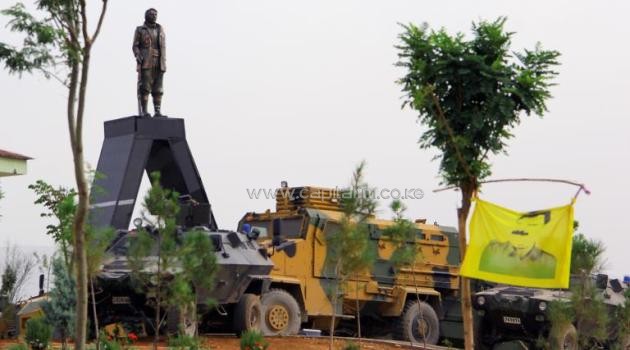
Turkish armoured vehicles surround a statue of Mahsum Korkmaz — one of the founders of the outlawed Kurdistan Workers Party (PKK) — as they tighten security in Diyarbakir, on August 19, 2014/AFP
ANKARA, October 14- Turkish jets bombed targets of the Kurdistan Workers’ Party (PKK) in southeast Turkey, officials said Tuesday, the first strikes on the outlawed group since a 2013 ceasefire amid growing concern about the peace process.
Turkish F-16 jets dropped bombs late Monday on PKK targets in the village of Daglica in the Kurdish majority Hakkari province near the border with Iraq, a security source told AFP on condition of anonymity.
In a separate incident also Monday, Turkish attack helicopters struck at PKK targets around the village of Geyiksuyu in the Tunceli province of eastern Turkey following raids by the PKK.
The fierce clashes between Islamic State (IS) insurgents and Kurdish forces in the key Syrian town of Kobane have shaken Turkey’s fragile peace process with the PKK, blacklisted as a terrorist organisation by Ankara and much of the international community.
Frustrated with Turkey’s lack of action to stop the IS advance in northern Syria on fellow Kurds, Turkey’s Kurdish community has taken to the streets in several cities in the southeast over the past week, with scores killed in deadly clashes.
President Recep Tayyip Erdogan blamed the unrest on the “dark forces” seeking to sabotage the delicate peace process with the PKK to end 30 years of violence that has claimed at least 40,000 lives.
The air strikes came one day before the October 15 deadline given by the PKK’s overall leader Abdullah Ocalan, who is serving a life sentence in an island prison on the sea of Marmara, for a roadmap to salvage the flagging peace process.
But Nihat Ali Ozcan, security analyst at Ankara based TEPAV think tank, said while the peace process could well be “dead in the water” one day, it would not be over just because of these latest incidents.
“It is not an easy task to manage the peace process,” he said.
– ‘Showing muscle’ –
Turkey, a NATO member, has tightened security on its volatile border after the escalating fighting in Kobane sparked the exodus of 200,000 refugees.
Kurds say they do not want Turkish troops in Kobane but want Turkey to allow its territory to be used for passing weapons to Kurdish fighters defending the key Syrian town, an idea Ankara has so far rejected.
One of the PKK chiefs said on Saturday it had called all its fighters back to Turkey, after the violent protests over the government’s policy on Syria.
Cemil Bayik, one of the founders of the PKK, also warned that the peace process was in danger of collapse and attacks could resume after the deadly unrest.
Prime Minister Ahmet Davutoglu, in a speech to his ruling party lawmakers Tuesday, made no mention of the air strikes but said the government was still committed to making peace with the Kurds.
“The peace process is not linked to Kobane. It’s not linked to any development that takes place outside our borders,” Davutoglu said.
Ozcan said the peace process could die in time but not now.
“The PKK and the government are making moves to show muscle to each other,” he said.
The PKK had been launching gun attacks on the police station in Daglica since Saturday because of the troubles in Kobane, security sources said.
The army has yet to release details on the air strikes but said in a statement on Saturday that “terrorists from the separatist terrorist organisation opened fire on our base in the Daglica region”.
“We responded spontaneously in the toughest possible way,” it said. In line with official practice, the Turkish army never refers to the PKK by name.
In the second incident, Turkey’s security forces and Kurdish rebels clashed in three different spots in the village of Geyiksuyu after the PKK attempted to infiltrate into military bases, local media reported.
After the rebel withdrawal, two Kobra helicopters conducted reconnaissance flights and bombed several PKK targets, according to the reports.









































